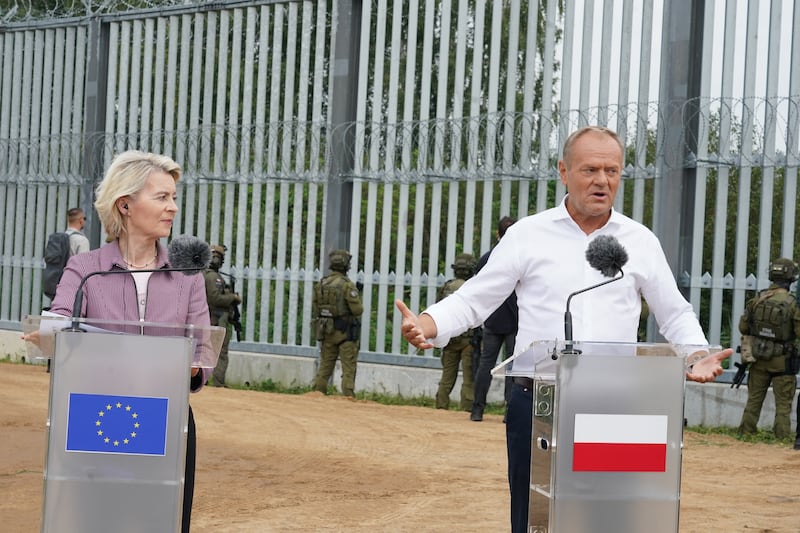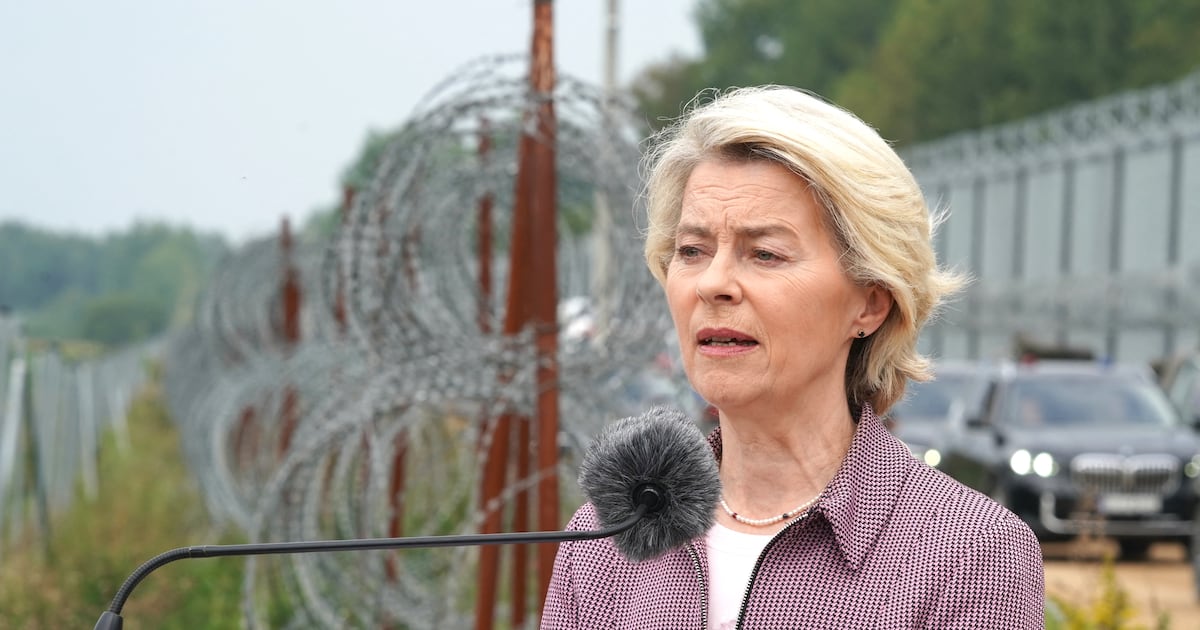European capitals are working on “pretty precise plans” for potential military deployments to Ukraine as part of post-conflict security guarantees that will have the full backing of US capabilities, Ursula von der Leyen has said.
There was a “clear road map” for possible deployments, the European Commission president told the Financial Times in an interview.
“Security guarantees are paramount and absolutely crucial,” Ms Von der Leyen said. “We have a clear road map and we had an agreement in the White House … and this work is going forward very well.”
Ms Von der Leyen spoke while on a tour of eastern European Union states close to Russia this weekend, during which she focused on efforts to increase national defence spending and bolster the continent’s military readiness.
 European Commission president Ursula von der Leyen and Polish prime minister Donald Tusk speak to journalists as they visit the fence at the Poland/Belarus border in Krynki, eastern Poland, on Sunday. Photograph: Janek Skarzynski/AFP via Getty Images
European Commission president Ursula von der Leyen and Polish prime minister Donald Tusk speak to journalists as they visit the fence at the Poland/Belarus border in Krynki, eastern Poland, on Sunday. Photograph: Janek Skarzynski/AFP via Getty Images
Her remarks came amid planning for a meeting of European leaders this week at which they are set to firm up national commitments to the western force.
She said capitals were working on plans for “a multinational troop [deployment] and the backstop of the Americans”.
“President Trump reassured us that there will be [an] American presence as part of the backstop,” she said. “That was very clear and repeatedly affirmed.”
Ukraine has demanded concrete security guarantees from its western backers, including troops on the ground, as part of any peace deal to end Russian president Vladimir Putin’s 3½-year war.
The troops are set to include potentially tens of thousands of European-led personnel, backed by assistance from the US including command and control systems and intelligence and surveillance assets. That arrangement was agreed at a meeting between Mr Trump, Ukrainian president Volodymyr Zelenskiy and senior European leaders last month.
Those who met Mr Trump in Washington are expected to gather in Paris on Thursday at the invitation of France’s president Emmanuel Macron to continue the high-level discussions, three diplomats briefed on the plans told the FT.
[ Kremlin says Europe is hindering Trump’s peace efforts on UkraineOpens in new window ]
They include German chancellor Friedrich Merz, UK prime minister Keir Starmer, Nato secretary general Mark Rutte and Ms Von der Leyen. The Elysée declined to comment.
Last week, defence chiefs from the so-called coalition of the willing met and had “worked out pretty precise plans”, Ms Von der Leyen said, including discussions on “the necessary items for a functioning build-up of troops”.
“Of course, it always needs the political decision of the respective country, because deploying troops is one of the most important sovereign decisions of a nation,” she added. “[But] the sense of urgency is very high … it’s moving forward. It’s really taking shape.”
Ms Von der Leyen praised Mr Trump’s commitment to participating in the peace effort, after months of uncertainty in European capitals about the stance of the US president, who had in the past praised Mr Putin and clashed with Mr Zelenskiy.
“Putin has not changed, he is a predator,” she said. “[Trump] wants peace and Putin is not coming to the negotiation table … He has a negative experience with Putin, more and more Putin does not do what he says.”
“[But] we have had in the last months several encounters where it was obvious that one can rely on the Europeans,” she added. “It is clear that when we say something, we do it.”
Any western military deployment to post-conflict Ukraine would support a significantly strengthened Ukrainian army; that would form the core of the deterrence force.
The commission would explore new funding streams to provide “sustainable financing of the Ukrainian armed forces as … a security guarantee”, Ms Von der Leyen said.
After any peace deal, Kyiv would need “quite a sizeable number of soldiers and they need good salaries and of course, modern equipment … it’s for sure the EU that will have to chip in”.
Existing funding streams from Brussels to Ukraine, including budgetary support, would need to remain during peacetime, Ms Von der Leyen said, meaning that “an extra payment … has to be provided for the Ukrainian armed forces”.
The EU will also maintain funding for the training of Ukrainian soldiers after any peace deal. It is encouraging member states to use a €150 billion loans-for-arms fund to either enter into joint production agreements with Ukrainian defence companies or to purchase weapons that can be given to Kyiv.
“The role of the commission is paramount in enabling the member states to finance a surge in defence,” Ms Von der Leyen said.
“The character of warfare has completely changed,” she added, citing the need for EU militaries to invest in drones, air and missile defence, space and cyber capabilities. – Copyright The Financial Times Limited 2025
